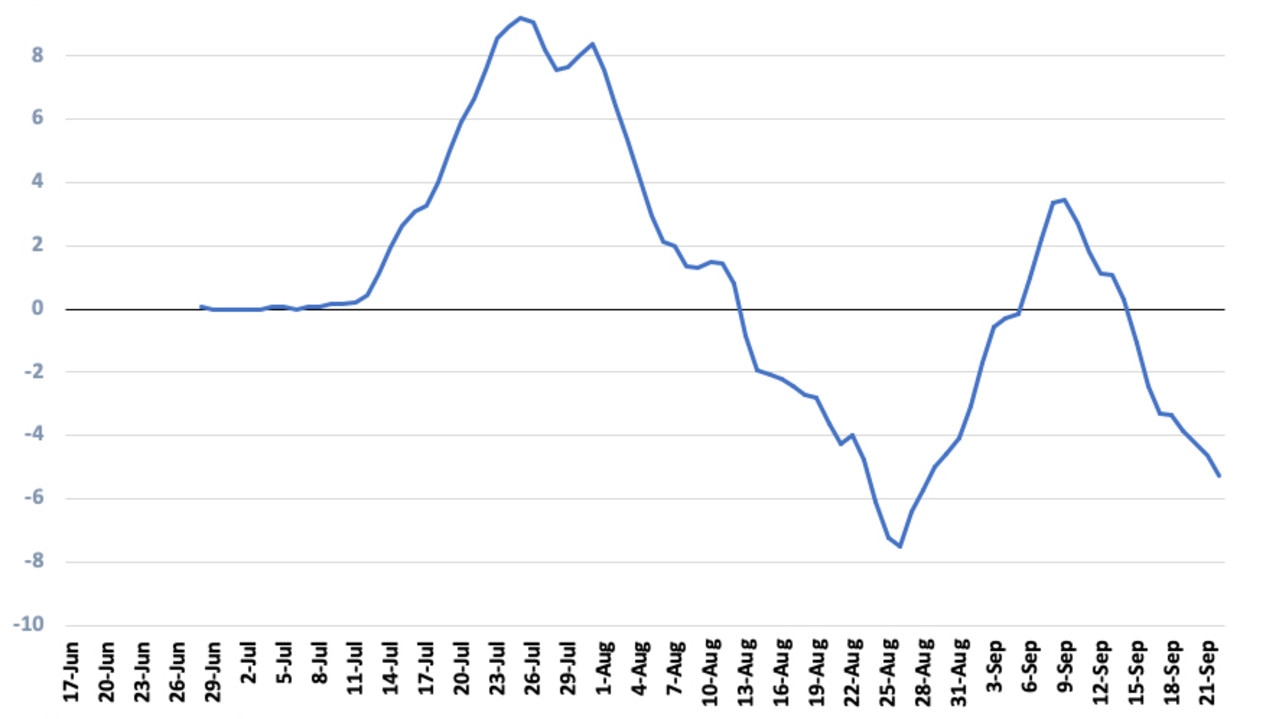NSW manages to turn its coronavirus cases around
While Victoria slipped into utter chaos, NSW successfully beat a looming second wave of coronavirus infections – but restrictions will stay.
NSW has managed to turn around its coronavirus cases and is now in the same position as it was in mid-May before Victoria’s outbreak saw cases skyrocket.
The state recorded no cases of community transmission in the 24 hours up to 8pm Monday — the first time since July, and followed this up with a second day of no transmission on Tuesday.
On Wednesday, NSW Chief Health Officer Dr Kerry Chant said the last coronavirus case recorded with an unknown source of infection was on September 7.
“So whilst we have had cases reported recently, we’ve been able to identify the source of those,” Dr Chant said.
“They’re pleasing numbers but it’s no time for complacency.
“We continue to ask the community to work with us to get the testing and rates up high, so anyone with any symptoms, however minimal, please come forward for testing.”
The positive result means other states, like South Australia, are now expected to re-open their borders with NSW.
However, NSW’s slow turnaround highlights how difficult it can be to get on top of coronavirus cases once they begin to spread. It has taken around two months for the state to get its cases under control after outbreaks in venues such as the Crossroads Hotel, which saw cases rise to a peak around August 1.
The good news is, authorities managed to bring down case numbers without going back into lockdown or making masks mandatory.
At its peak the 14-day average total of cases in NSW was 181 cases (not including travellers), which is an average of 13 cases per day. It has now dropped to below five, University of NSW Professor Mary-Louise McLaws told news.com.au.
“This puts NSW back in a very safe position,” she said.
“It’s a relief the NSW ministry has put NSW back into the position they were in before they were sadly seeded by cases from Victoria in July.”
Prof McLaws said the state had what she categorised as “amber” and “red” zone numbers from July 18, when cases hovered between 62 to 89 before ramping up to 100 and over.
She now considers the state’s numbers to be in the “green” safe zone, and they have been in this zone since September 16.
Despite the good news, Prof McLaws said it was probably too early to start removing restrictions on size of groups allowed to congregate.
“They should do that slowly and judiciously,” she said.
RELATED: Follow our live coronavirus updates
RELATED: Two states to finally open to NSW

NSW Premier Gladys Berejiklian also indicated on Tuesday she was in no rush to wind back restrictions.
“I’m incredibly pleased to see where we’re at but we can’t be complacent,” she said.
“The last time we were complacent the Victorian situation came up and then we had to really go through that difficult through months but we are in a very good space at the moment and we need to make sure we continue on this path.”
Prof McLaws said Victoria should also not be pushed into relaxing its restrictions too early.
“Victoria will also get to this stage if they’re not pressured unduly to lift restrictions too fast,” she said.
“However, they were never in the green zone like NSW so they also need to evaluate what happened and why, to ensure it doesn’t happen again.”
If state borders are to be reopened Prof McLaws believes every state and territory government needs to come to an agreement on the number of cases that would trigger a response.
Prof McLaws believes Victoria waited too long before taking action.
The state did not introduce a lockdown until July 1 but cases had already entered the red zone on June 18, two weeks earlier.
By July 1, the 14-day average was already at 34 cases a day, she said.
“I would have gone in much earlier and I think most other outbreak epidemiologists would have as well, because we see the challenges it brings,” Prof McLaws said.
“I think every state and territory, particularly NSW and Victoria, need to learn not to wait until they are in the red zone before implementing outbreak strategies.”
The ringfencing of hotspot suburbs in Victoria was also not strict enough, Ms McLaws said, because people were allowed to enter and leave the locked down areas.
“You can’t allow people to enter or leave,” she said.
“You’ve got to do it properly and you’ve got to ringfence hard.”




